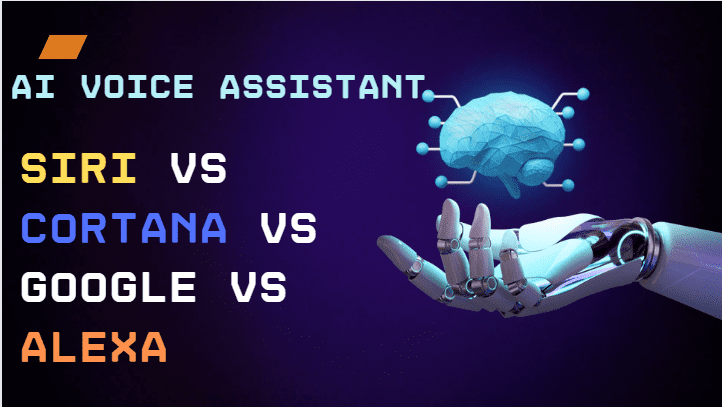AI voice assistants are becoming a crucial part of our daily lives – they help us accomplish tasks, answer questions, and provide convenient hands-free interaction with our devices. There are four frontrunners in the AI assistant space – Siri, Cortana, Alexa, and Google Assistant.
From executing demands to understanding natural language, these voice assistants are undoubtedly revolutionizing the way we interact with technology, making our lives more convenient and connected. In this blog, we will explore these top-rated voice assistants and discover which one comes on the top in the race of AI assistants.
So, without further ado, let’s get started!
Siri, Cortana, Google Assistant, and Alexa: Which Voice Assistant Reigns Supreme?

Furthermore, we will talk about the features and other capabilities of these voice assistants to help you discover which is the best one for your daily needs and offer convenience.
Accessibility
Google Assistant is available on all iOS and Android devices as well as Chromebooks. Google has its own line of home speakers including Google Home Mini, Google Home, and Google Home Max. These speakers come with an in-built Google Assistant.
Microsoft’s Cortana comes standard on Windows. It was previously available on iOS and Android devices as well. But the company has pulled it down from app stores because of its decline in popularity among users.
Amazon’s smart assistant Alexa is accessible through the Amazon Echo line of speakers as well as on Fire Tablets and Fire TV by Amazon. There are also some third-party speakers and devices that support Alexa like Altec Lansing Versa Smart Portable speakers and Sonos wireless speakers.
Siri can be accessed on all Apple devices, including laptops, smartphones, tablets, and smartwatches. Apple also has its own speaker HomePod.
Features and Capabilities
All the virtual assistants come with common functions like making calls, sending emails and texts, setting events on calendars, and playing music. But these individual virtual assistants also feature unique features and capabilities.
While Siri and Google Assistant use the Google search engine for responding to user queries, Cortana uses Bing, Microsoft’s search engine.
Google Assistant has another advantage for those who regularly use the Google search engine – it knows a lot about users. It provides arguably the most personalized services.
Some of the features offered by these virtual assistants also depend on which platform you are using them. For instance, Google Assistant has the capability to read news on a Home speaker. Cortana can do the same on a smartphone. Alexa is great for simple commands and ordering from Amazon.
However, if you are in search of personalization and natural communication, Google Assistant is the right choice for you!
Voice Accuracy
Each voice assistant has a wake word or phrase like Ok Google, Hey Cortana, Alexa, and Siri. The Wake word tells the assistant to listen and respond to whatever the user is asking.
While all these voice assistants offer excellent voice recognition, Siri and Google Assistant are better at picking up what you say – especially if there is environmental noise. Although Microsoft claims that it has a good understanding of context, it does struggle in hearing what you say as does Alexa.
Google Assistant also provides fast replies to queries when compared to others. Alexa and Siri are also good when it comes to responding to questions of users. However, with Cortana, there have been issues with understanding even basic requests despite no problems with their microphones.
So, when it comes to voice recognition, Siri and Google Assistant win the category. And when it comes to response time with queries, Google Assitant is the clear winner.
Ease of Setup
Google Assistant, Siri, and Alexa can be set up in just 45 seconds, while Cortona requires a Microsoft email id and other layers of authentication to access the service. Cortana doesn’t allow you to sign up with your phone number. You can just sign up with your email address which is not related to work or school. In the case of other assistants, you just need an email address to sign up.
Support for languages
Be it any virtual assistant – Cortana, Siri, Alexa, or Google Assistant – it is of no use without any language support. This is the reason why voice assistants support multiple languages and are capable of serving as many people as possible from various demographics.
When it comes to Google Assistant, it can support around 44 languages, including English, Danish, Dutch, etc. Siri supports 21 languages in over 36 countries that include German, French, English, Chinese, and Spanish.
Cortana is currently available in 8 languages. This includes Portuguese, German, Japanese, Italian, and more. Alexa also as of now supports 9 languages but only 1-2 are supported in most countries.
So, Google Assistant is the clear winner when it comes to support for languages.
Conclusion
After a thorough comparison of the above-mentioned virtual assistants, it wouldn’t be wrong to say that Google Assistant and Siri are leading the race. If you ask me, I will definitely suggest Google Assistant as it is a perfect blend of usability, diversity, and compatibility. However, none of these assistants are perfect and have a long way to go. Ultimately, the choice depends on the user’s preference and convenience.
Related Posts
What is a juice-jacking attack? How can we be safe from such attacks?
Getting the right dashcam for your needs. All that you need to know
WhatsApp iPad App Gets Major Overhaul, Adds New Communities Feature
AirGo Vision- Solos’ Smart Glasses with AI Integration from ChatGPT, Gemini, and Claude
Moto G85 5G launched in India but is unlikely to beat VIVO or XIAOMI
Rise of deepfake technology. How is it impacting society?